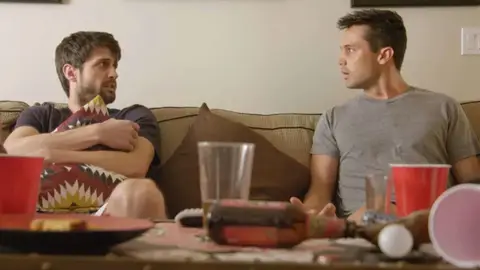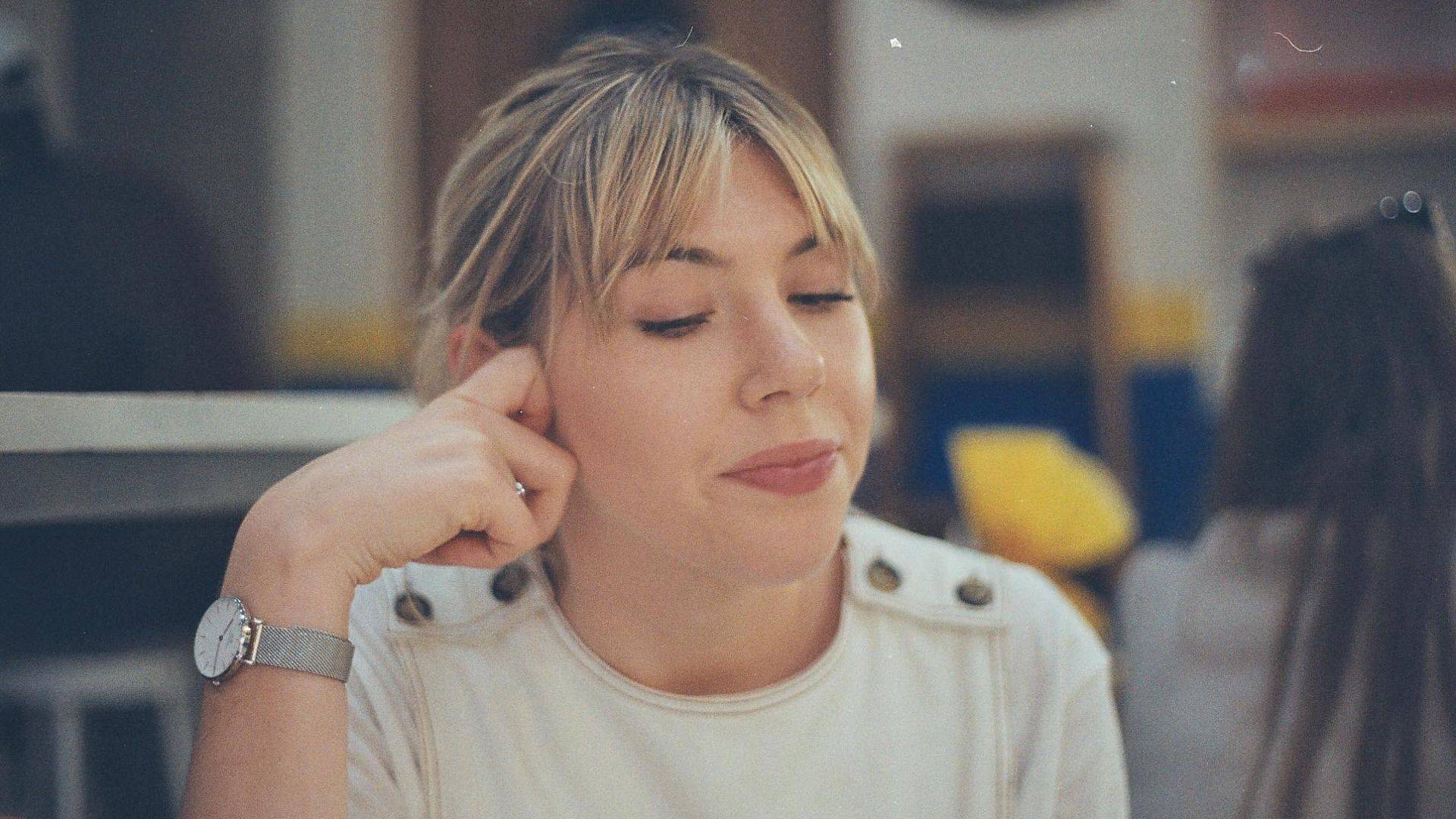The Quiet Terror Of Getting Older

Life is exhausting, isn’t it? I don’t know if it’s a byproduct of being thrashed by an endless stream of content (all of the time) or a fundamental part of the human spirit – but I’ve noticed I’m rarely, if ever, truly satisfied. Even in my happiest moments; lurking in the periphery, is a tiny little voice parroting: “but you could be doing this”. The end game – whether it’s a haircut or a promotion – isn’t really the end game: it’s just another stepping stone to the next thing you feel you must achieve or do or be. Only then will you become the whole, perfect version of yourself; to have fully arrived.
As you can probably tell, I’ve thought about this a lot. So, when the opportunity to speak to the creators of Everyone Is Doing Great presented itself – a show about this very predicament of adulthood, ambition, success and self-doubt – I knew I’d be saying yes. Co-creators James Lafferty and Stephen Colletti also star as Jeremy and Seth, two washed-up hot guys five years off the back of the finale of a fictional hit teen-vampire soap, Eternal. Despite runaway success in their twenties, they’re struggling to find their footing in a cut-throat industry that has very much moved on. They didn’t think their lives would be like this – and certainly not their thirties.
Of course, James Lafferty and Stephen Colletti are themselves two former teen stars most recognisable for their roles on the hugely popular One Tree Hill (and Stephen’s earlier stint on our very own Laguna Beach) so they write from experience. It’s this real-life backstory that makes the show so fascinating to watch. It also makes for one hell of an interview. I spoke to James and Stephen about what it’s like to be teen heartthrobs; the awkwardness of aging out of that title; the pressures we put on ourselves to succeed; and how growing up just means realising you never knew anything to begin with.
There are some clear parallels between your characters in Everyone Is Doing Great and both of your real-life experiences: both are actors five or so years off the back of a very successful TV franchise. How much did you lean on your own personal experiences in writing and portraying these characters?
James Lafferty: Stephen said it really well the other day; something to the effect of, we took who we could have become if we hadn't matured at a certain point in our lives and sort of extrapolated that. Like, ‘What would we become if we went down this path, if we just stopped in this way and never really developed past this point?’ We used that question to explore what our career would be like, what our life would be like, that kind of thing. That way, we were able to build the character from a place that felt authentic, where we would have plenty to relate to them on, but also it would be far enough away from us to actually be a character, so that we're not making some sort of reality TV show.
Stephen Colletti: I feel like there's a world where [in] certain points in my life, where you have a decision to grow up a little bit or to kind of continue to spin your wheels in what you've been doing for the majority of maybe your twenties. These guys are very late to mature. I think, happily, James and I matured a little bit quicker than [our characters] Seth and Jeremy. Seth and Jeremy would never be able to make a TV show together. They can barely keep each other standing, let alone produce, crowdfund and star in their own TV show that they're also writing and directing and all that stuff.
There’s a lot of pressure that comes with getting older. I can imagine that those feelings may be exacerbated when you’ve been so successful and famous at a young age. I'm curious as to what both of your own relationships are with getting older and what it was like to lose the shackles of that teen heart-throb status?
James: These are really good questions. I think that's really the heart of this story is that question – and that question continues to come up the older you get. I'm 36 years old, and I still feel like every year of my life, I have more questions than I did in the year before. I was a lot more sure about myself in my twenties than I am now. I know that I'm smarter and more mature than I was in my twenties, yet the world seems like a scarier place the older you get for some reason. That's just my personal experience so far in life.
Whether or not you're coming from One Tree Hill or you are coming out of a job and trying to start over with your career – or just starting over in general at this point in life – it’s kind of scary because you feel like you should be where you thought you were going to be already. You might've had a ticking clock for yourself in your subconscious that you hadn’t confronted yet.
Now, you're there and you're like, ‘All right, when am I going to get there?’ That's what we really wanted to explore with this show is starting over [in your late twenties and thirties]. We're hoping that it would resonate with people that don't have an entertainment background. Just people might see themselves at this junction in life, where these characters are, and be able to poke fun at it. At the end of the day, the fact that we all still feel like children, even though we're older and adults is... there's a lot of humor in that.
Oh it definitely resonates. I find this ticking clock concept you mentioned quite interesting. I feel like a lot of people who are perhaps less conventionally successful than you guys would relate to that, but it's intriguing that you both feel this way – you've done some really incredible work, you're really recognised in your fields, yet you still have these feelings of uncertainty and time running out.
Stephen: Yeah, I would say it's always kind of searching for that next thing; that next mountain to climb. It's been something for us, working on the show and getting to this point where we're at Paramount+ is like getting to the top of a mountain and not even really having time to catch our breath [before we think about the next thing].
There's a wonderful era of invincibility when you're in your twenties. As that starts to fade and you reach your thirties, and your world starts to become smaller and responsibilities weigh heavier, it can really take away some of that ambition to just go out and say, ‘Screw it. I'm going to go get it done.’
The things that could go wrong creep into your mind more and I think hold us back from getting to those places. It's really hard, I think, to set out once you're in your thirties or approaching middle age, to have these goals, big aspirations and dreams and go after them just because you're much more hardened by the world up to that point.
Let’s talk about those casting meetings in the show – some of which are actually outrageous. How much of those depictions are actually what it's like when you walk in for a casting?
Stephen: I feel like it's right on par with some of the situations that we've been in. Everyone’s got their stories. You go to so many auditions. You audition a lot. The majority aren’t successful. I mean, everyone bats a pretty low percentage as far as succeeding in your own auditions goes. You hear about the success stories and somebody got a job in a show you’ve about to see. But for every success, there's a heck of a lot of failure. Sometimes there’s animals in the room or unexpected clothes; like a pillow and a blanket being moved into the centre of the room. Again, maybe a bad day of the casting director or somebody who's going to pass judgment on you before you walk into the room and you hear it as you're around the corner. I mean, I could go all day.
James: Sometimes you screw yourself over. You go in there and you have a good read, but then you trip on the chair on your way out of the room or you're so nervous that you're sweating through your shirt or you forget the lines. There's definitely no shortage of ways that the environment can mess with you or you can mess with yourself, I think. Yeah, it's 50-50.
It sounds like a very awful job interview.
Stephen: Absolutely. It's a total beast. There is an art to mastering the audition... I mean, we take classes for this. I've learned some of the most about the craft of pursuing the business in some of those audition [training] intensives, just about how to go in there and not shoot yourself in the foot immediately. It's intense, but there's kind of a little... I don't know. Maybe I'm a masochist, but there's a sick [sense of] challenge to it, I think, that whatever percentage you have of finding success, you're always seeking that out.
How do you come back from a bad casting call, though?
Stephen: Just be wonderfully ignorant. I also have the memory of a goldfish. My pea brain right here has been key.
James: Yeah, yeah. I've always had a terrible short-term memory and I honestly think that's part of what keeps me coming back for more. I'm grateful for it. I'm very grateful for it. It's like with sports, you've got to embrace the wins and forget the losses, and to do that, you kind of have to have a short memory.
Watch Everyone Is Doing Great on Paramount+ now. Sign up for a seven-day free trial.
Words and interview by Alice Griffin, editor of this very site. Catch her on Twitter and Instagram at @_alicegriffin.





